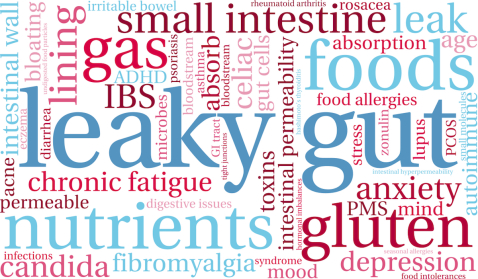March Blog
LEAKY GUT SYNDROME
What is leaky gut syndrome? From our research, it is a condition that is just being recognized and diagnosed. “Leaky gut” is a condition describing intestinal permeability or intestinal hyper-permeability. The spaces between the cells of the intestinal tract get so wide and permeable that they leak! Sounds bad and should be considered a serious health issue.
From the time food enters your mouth until it leaves your body through elimination, your intestinal wall separates what you ingest from the rest of your body. Normally, a healthy digestive system breaks down your food and only lets simple, small molecules like vitamins, minerals, simple sugars, and amino acids get absorbed and passed into your bloodstream. Basically, the lining or the tight junctions of the small intestines, which control what passes through the lining, don't work properly or become damaged allowing digestive ingredients to enter the blood stream. The rupture or tear in the intestinal lining causing food particles, toxic waste and bacteria to enter the bloodstream causing the body’s autoimmune system to respond, as it should, to react by attacking itself!
Leaky gut also causes many additional symptoms such as: migraines, eczema, chronic fatigue, bloating, gas, cramps, food sensitivities, nutritional deficiencies, joint and muscle aches, confusion and memory loss. But leaky gut is something of a medical mystery. This condition should be considered serious! Because of damage, the intestines cannot produce needed enzymes that are utilized in the proper digestion of food particles. Leaky gut symptoms are another reason that doctors don't like this condition,” says Gordon. “The symptoms are too messy — they can be [due to] almost anything."
What causes leaky gut syndrome? It depends on who you ask. Mainstream medicine isn't convinced it exists. “From an MD’s standpoint, it’s a very gray area,” says gastroenterologist Donald Kirby, MD, director of the Center for Human Nutrition at the Cleveland Clinic. Tests often fail to uncover a definite cause of the problem. “Physicians don’t know enough about the gut, which is our biggest immune system organ. We don’t know a lot but we know that it exists,” says Linda A. Lee, MD, a gastroenterologist and director of the Johns Hopkins Integrative Medicine and Digestive Center. “In the absence of evidence, we don’t know what it means or what therapies can directly address it.”
The problem is that leaky gut syndrome, which is readily recognized by alternative health practitioners, gets little respect from mainstream medicine. And Bruce Gordon, MD, chief of otolaryngology at Cape Cod Hospital and clinical instructor at the Massachusetts Eye and Ear Infirmary in Boston, doesn’t know why that is so. "There are plenty of people doing work on leaky gut syndrome, but almost nobody wants to talk about it for fear of being considered a quack,” says Dr. Gordon. “Leaky gut symptoms are widely recognized in the ear, nose, and throat allergy community, but we don't talk about it because we want to be considered mainstream."
Some of the most obvious causes are caused by eating foods that create an allergic or sensitivity reactions or medications. The body doesn’t recognize these foods as nutrients and instead creates antibodies to fight what it thinks are foreign bodies. Antibiotics and steroids can also thin-out the intestinal linings. This causes the intestinal lining to become irritated, resulting in tears or breaks in the intestinal wall which can be extremely painful.
Chronic stress may also be a factor, Dr. Lee says. Patients are urged to reduce stress through medication or meditation. That’s what you need to focus on. “Chronic health problems are often due to lifestyle, the way we live and eat, there are no pills for those” she says.
Another condition connected to leaky gut syndrome is a condition called SIBO (small intestinal bacterial overgrowth). SIBO can occur when the stomach doesn’t produce enough HCL and bad bacteria can take residence in the small intestine.
People with celiac and Crohn’s disease experience this symptom. “Molecules can get across in some cases, such as Crohn’s, but we don’t know all the causes,” Lee says. Whether hyper-permeability is more of a contributing factor or a consequence is unclear. But why or how this happens in individuals without those conditions is not clear. Treating Crohn’s or celiac disease, will often resolve symptoms. Diet likely plays a big role in having a leaky gut, Lee and Kirby agree. If you recognize the symptoms, seeing a gastroenterologist who is also trained in nutrition is advised.
Treatment Without Research
“We are in the infancy of understanding what to do,” Dr. Lee says. “People who are making claims about what to do are doing so without evidence.” There are web sites offering information on the leaky gut subject that recommend L-glutamine supplements to strengthen the lining of the small intestine. Dr. Lee indicates that given glutamine’s role in intestinal function, there is no research to back up such claims. But isn’t a healthy intestine being proactive?
Here are examples of factors that may contribute to leaky gut:
- Alcohol and caffeine
- Antibiotic medications
- Antacid medications
- Anti-inflammatory medications like aspirin or ibuprofen
- Food additives
- Food allergies
- Bowel infections
- Stress
Diagnosing and Treating Leaky Gut
A stool test, the Genova test, which looks for friendly and not-so-friendly bacteria, parasites and yeast, can be taken also. This test can cost upwards of $400 with insurance companies unlikely to pay for. Allergy tests seem to also aid in making a diagnosis.
Some suggestions for treatment can involve:
- Nutritional changes
- Allergy treatment
- Specific, culture-based, antibiotics or antifungal medication
- Probiotics
- Digestive enzyme supplements
- Strict diet control
- Oral allergy medication
- Time
- Radiation therapy
Herbs and Supplelment for review
- Serotonin - a neurotransmitter sometimes called the “happy hormone” because it regulates mood as well as sleep, anxiety, and depression. 90% of your serotonin is made in your GI tract! Research by Caltech scientists show that we depend on probiotics living in the gut to produce the serotonin we need.
- Collagen - helps tighten and tone your digestive tract. Collagen contains amino acids that are essential to cell growth. Those cells work to repair your damaged intestinal wall, by closing up the widened pores and helps keep harmful toxins from passing into your bloodstream.
- Probiotics - supplementing with a high-quality probiotic is absolutely necessary for gut health today. Look for labeling that indicates the type of CFU’s, colony forming units, which are present at the time of manufacturing.
- Fiber - without fiber, probiotics cannot live. Indigestible fibers, or prebiotics, are the food that assists probiotic bacteria thrive in the intestines. A diet rich in high fiber foods such as: sprouted chia seeds, sprouted flaxseeds, and sprouted hemp seeds is so important.
- Enzymes - help completely break down proteins, complex sugars and starches which can reduce intestinal inflammation. A full spectrum enzyme supplement that contains the following
- Protease – breaks down proteins (including gluten)
- Amylase – breaks down starches
- Lipase – breaks down fats
- Lactase – breaks down lactose in dairy
- L-Glutamine - An essential amino acid and anti-inflammatory, shoes significant health benefits including repairing the gut and intestinal lining. Glutamine fuel for cells that line the intestines to keep them healthy — and can help repair leaky gut, in particular. I recommend taking 2-5 grams of L-glutamine powder 2-3x daily. The best form is
L-alanyl-L-glutamine.
- DGL Licorice Root - Licorice can help support the body’s natural processes for maintaining the mucosal lining of the stomach and duodenum. It is especially beneficial if someone’s leaky gut is being caused by emotional stress.
- NAG - N-acetyl glucosamine is now widely accepted that it aids in protecting the lining of your stomach and intestines. Because of its anti-inflammatory effects, NAG is also reported to aid with osteoarthritis and inflammatory bowel disease (IBD), including ulcerative colitis and Crohn’s disease.
- Quercetin - helps seal the gut lining by creating tight junction proteins. According to the University of Maryland Medical Center researchers, the key to quercetin’s effectiveness is its ability to keep inflammation at bay.
- HCL with Pepsin - Hydrochloric acid is the main acid in the stomach that breaks down protein during pre-digestion prior to entering the duodenum and the intestines.
- Anti-Fungal - fungal agents like caprylic acid, cellulose, and oil of oregano can be taken for short term treatment of leaky gut syndrome. One of the main causes of leaky gut syndrome can be imbalance flora in your gut including an overgrowth of yeast and candida. These anti-fungals help balance the good and bad bacteria in the intestines.
ALWAYS CONSULT YOUR PERSONAL HEALTH CARE PRACTITIONER
- http://health.facty.com/ailments/body/10-symptoms-of-a-leaky-gut/?utm_source=bing&utm_medium=c-search&utm_term=%2Bleaky%20%2Bgut&utm_campaign=f-h-10-symptoms-of-a-leaky-gut&msclkid=d9e1e881e9b814ca75f4b2a98b0138e6
- https://www.webmd.com/digestive-disorders/features/leaky-gut-syndrome#1
- https://www.everydayhealth.com/digestive-health/what-is-leaky-gut-syndrome.aspx
- https://www.perfectorigins.com/perfectbiotics?source=1d5bf25e-28a5-4a21-8d13-2ec7f1ef34ab&subid=wVF583567SCM3P7CHS15RM48
- https://www.guthealthproject.com/the-powerful-supplement-you-need-to-heal-a-leaky-gut/
- https://draxe.com/leaky-gut-supplements/




